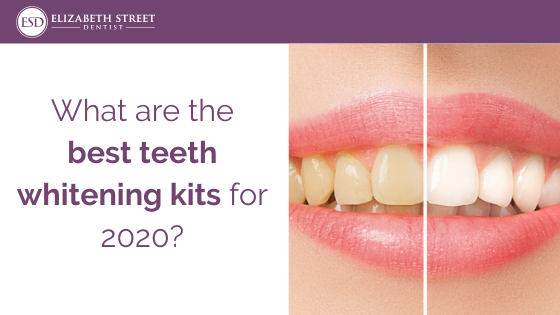
What are the best teeth whitening kits for 2020?
Posted by: Dr Monica Amin
Teeth whitening is the only common procedure in dentistry, primarily because it is possible to whiten almost anyone’s teeth with very little preparation, in very little time and at relatively low cost.
But with so many options available from DIY whitening kits, to whitening toothpaste and dental practice whitening, how do you know which one is the best whitening kit to use?
This article is written primarily for our patients looking for teeth whitening in Victoria and Belgravia, but if you’re reading from elsewhere it will also be incredibly useful.
How does teeth whitening work?
Organic molecules have a tendency to reflect light in different ways, sometimes they reflect light in such a way that it makes to look stained or discoloured. Teeth whitening works because the hydrogen peroxide in the gel used releases oxygen. This oxygen reacts with the organic molecules affecting the way they reflect light, effectively making them lighter.
The higher the percentage of hydrogen peroxide in the whitening agent, then the faster and whiter the teeth will be whitened.
Here’s how much hydrogen peroxide is in typical teeth whitening agents:
- Store bought teeth whitening kits – typically 0% concentration, other agents are used.
- The maximum percentage hydrogen peroxide that can be sold without prescription by a dentist is 0.1%.
- Dentists will typically use concentrations of up to 6% released hydrogen peroxide.
What is the best teeth-whitening kit to do at home?
There are 3 primary ways you can whiten teeth at home.
- Maintain a healthy oral hygiene routine.
- Teeth whitening toothpaste.
- Teeth whitening strips.
Maintaining a healthy oral hygiene routine.
This is the simplest and easiest way to keep a bright, white smile. Plaque can build up in between your teeth if you don’t have a good routine from brushing your teeth, this plaque is much softer than natural teeth and therefore has a tendency to pick up stains much quicker, particularly if you smoke or drink lots of red wine or tea. Keeping your teeth clean helps to keep this plaque at its lowest level and therefore your teeth at their whitest.
Teeth whitening toothpaste.
These usually come in a couple of formats:
- chemical teeth whitening
- herbal teeth whitening
The herbal teeth whitening toothpastes contain a range of naturally occurring herbs which allegedly can whiten teeth, the whitening toothpastes utilise chemicals to whiten teeth. However, the chemical components which whiten teeth in these types of toothpastes are usually simple abrasives. Rather than actually whiten teeth they can have a tendency to be more abrasive, which is actually how they make teeth look white.
Herbal teeth whitening toothpastes do not have the ability to whiten teeth as much as chemical toothpastes.
In summary. Chemical teeth whitening toothpastes can whiten teeth but may have a detrimental effect on the surface of the tooth by being abrasive. Herbal teeth whitening toothpastes do not statistically whiten teeth but are kinder to the surface anatomy of your teeth.
Reference: “Comparison between the effect of commercially available chemical teeth whitening paste and teeth whitening paste containing ingredients of herbal origin on human enamel.” Kalliah C et al, The international quarterly Journal of research in Ayurveda, 2018 Apr-Jun; 39(2): 113–117.
Teeth Whitening Strips
Teeth whitening strips prescribed by your dentist typically contain around 6% hydrogen peroxide. however, in order to be sold over-the-counter to the public the hydrogen peroxide levels need to be kept lower than 0.1%. This is because the hydrogen peroxide, whilst whitening the teeth, can also damage the delicate gum area. If you decide to use teeth whitening strips you should make sure you follow the instructions to the letter to avoid any damage to your gums.
Do teeth whitening pens work?
There are 2 different types of teeth whitening pain commonly available:
- Peroxide containing whitening pens – when these pens are used the hydrogen peroxide will react with the teeth giving them a whiter effect, however because there is little control over exactly where the whitening agent goes the peroxide concentration has to be kept to a minimum. As you can imagine, when the whitening gel from the pain is applied to the tooth it could accidentally touch the gum and almost certainly will touch the inside of your lip after application. Whilst whitening pens can work, the effects can be fairly minimal.
- White coating pens – these pens simply apply a white varnish over the surface of your teeth. They are usually effective if you are going out to a party and want to have white teeth just for that evening. The white coating will inevitably wear off over the evening and is unlikely to resist lots of eating and/or drinking.
How to whiten teeth safely?
The safest way to whiten teeth is to go to a dentist. This is because a dentist will:
- Remove any surface plaque from the teeth prior to whitening – if there is even the smallest amount of plaque on the surface of the teeth then it is this which will whiten, not the teeth themselves. Whilst this might give in immediately whiter result, your teeth will darken again incredibly rapidly, likely within one week.
- Check your teeth for problems prior to whitening – if you use hydrogen peroxide releasing agent and have a small crack in your teeth this can aggravate sensitive teeth, it is unlikely you would be able to spot these cracks yourself.
- Ensure that the whitening agent only goes on your teeth – if the tiniest amount of hydrogen peroxide teeth whitening gel makes its way onto your gums then it can burn these soft and delicate areas. Beauty therapists sometimes offer teeth whitening, this is, however, illegal in the UK but most importantly, because they are not trained to spot all of the problems and warning signs prior to carrying out the whitening the results can be quite varied or even dangerous!
How to whiten your teeth permanently?
Teeth whitening at the dentist will typically last about 3 years, after which time your teeth will have darkened almost back to their original colour. This is because the organic molecules which cause the darkening work their way back into your teeth, you then need to have another teeth whitening treatment in order to remove them.
If your teeth are particularly dark and/or you require tooth reshaping then a more permanent way to whiten teeth is dental veneers. These are not usually the 1st treatment option for teeth whitening as they are more destructive than simple teeth whitening treatments. Porcelain veneers will, however not this, overtime and will give a permanently white smile.
Porcelain veneers are entirely dependent upon the correct application of the materials and techniques available as well as the goals of the treatment. Coupled with this, the skill of your cosmetic dentist and dental technician will greatly impact the final result. Always make sure you do your research when looking for a cosmetic dentist.
- Tooth Gems – Why You Should Avoid Them - 28th January 2024
- Why Do I Have Black Lines On My Teeth? - 31st December 2023
- Invisalign®. We Answer Some Of The Most Popular Questions - 28th October 2023

